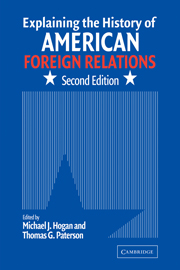Book contents
- Frontmatter
- Contents
- Preface to the Second Edition
- Contributors
- 1 Introduction
- 2 Defining and Doing the History of United States Foreign Relations : A Primer
- 3 Toward a Pluralist Vision : The Study of American Foreign Relations as International History and National History
- 4 Theories of International Relations
- 5 Bureaucratic Politics
- 6 Psychology
- 7 National Security
- 8 Corporatism
- 9 World Systems
- 10 Dependency
- 11 Considering Borders
- 12 The Global Frontier : Comparative History and the Frontier-Borderlands Approach
- 13 Modernization Theory
- 14 Ideology
- 15 Culture and International History
- 16 Cultural Transfer
- 17 Reading for Meaning : Theory, Language, and Metaphor
- 18 What's Gender Got to Do with It? Gender History as Foreign Relations History
- 19 Race to Insight: The United States and the World, White Supremacy and Foreign Affairs
- 20 Memory and Understanding U.S. Foreign Relations
- Index
6 - Psychology
Published online by Cambridge University Press: 05 June 2012
- Frontmatter
- Contents
- Preface to the Second Edition
- Contributors
- 1 Introduction
- 2 Defining and Doing the History of United States Foreign Relations : A Primer
- 3 Toward a Pluralist Vision : The Study of American Foreign Relations as International History and National History
- 4 Theories of International Relations
- 5 Bureaucratic Politics
- 6 Psychology
- 7 National Security
- 8 Corporatism
- 9 World Systems
- 10 Dependency
- 11 Considering Borders
- 12 The Global Frontier : Comparative History and the Frontier-Borderlands Approach
- 13 Modernization Theory
- 14 Ideology
- 15 Culture and International History
- 16 Cultural Transfer
- 17 Reading for Meaning : Theory, Language, and Metaphor
- 18 What's Gender Got to Do with It? Gender History as Foreign Relations History
- 19 Race to Insight: The United States and the World, White Supremacy and Foreign Affairs
- 20 Memory and Understanding U.S. Foreign Relations
- Index
Summary
Was Richard M. Nixon mad when he assumed responsibility for U.S. foreign policy? The attention paid to his personality, particularly after the Watergate break-in, suggests that many people believed him to be so, or close to it. In one context Nixon evidently preferred it that way: He intended to persuade Hanoi that it must either agree to a quick peace or, according to H. R. Haldeman, face the consequences of a madman cocking the trigger on the American nuclear shotgun. “They'll [the leaders of the Democratic Republic of Vietnam] believe any threat of force Nixon makes because it's Nixon,” the president reportedly confided to his White House chief of staff. “I want the North Vietnamese to believe I've reached the point where I might do anything to stop the war. We'll just slip the word to them [that we] can't restrain him when he's angry … and Ho Chi Minh himself will be in Paris in two days begging for peace.”
Whether Nixon sincerely sought to portray himself as a madman, was mad to think he could, or was just plain mad cannot be determined conclusively from the available evidence, although many writers have tried. Because Haldeman was reconstructing from memory a conversation that occurred some ten years earlier, moreover, he could have distorted the president's words or manufactured the incident to serve his own purposes. Yet Haldeman alleges the conversation did take place, and it is plausible that it did and his recollection of it is accurate.
- Type
- Chapter
- Information
- Explaining the History of American Foreign Relations , pp. 103 - 122Publisher: Cambridge University PressPrint publication year: 2004
- 1
- Cited by



